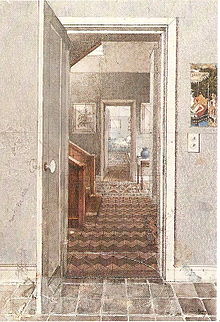- Gordon Cullen
-
Thomas Gordon Cullen (b. 9 August 1914, Calverley - 11 August 1994, Wraysbury) was an influential English architect and urban designer who was a key motivator in the Townscape movement. He is best known for the book The Concise Townscape, first published in 1961.
Contents
Biography
Cullen was born in Calverley, Pudsey, near Leeds. He studied architecture at the Royal Polytechnic Institution, the present day University of Westminster, and subsequently worked as a draughtsman in various architects' offices including that of Berthold Lubetkin and Tecton, but he never qualified or practised as an architect.
Between 1944 and 1946 he worked in the planning office of the Development and Welfare Department in Barbados, as his poor eyesight meant that he was unfit to serve in the British armed forces. He later returned to London and joined the Architectural Review journal, first as a draughtsman and then as a writer on planning policies. There he produced a large number of influential editorials and case studies on the theory of planning and the design of towns. Many improvements in the urban and rural environment in Britain during the 1950s and 1960s. He was also involved in the Festival of Britain in 1951.
His techniques consisted largely of sketchy drawings that conveyed a particularly clear understanding of his ideas, and these had a considerable influence on subsequent architectural illustration styles. He also illustrated several books by other various authors, before writing his own book - based on the idea of Townscape - in 1961. The Concise Townscape has subsequently been republished around 15 times, proving to be one of the most popular books on Urban Design in the 20th Century.
In 1956 Cullen became a freelance writer and consultant and, in the years immediately following he advised the cities of Liverpool and Peterborough on their reconstruction and redevelopment plans. In 1960 he was invited to India to advise on the planning aspects of the Ford Foundation's work in New Delhi and Calcutta and so in 1962 he and his family lived in India for 6 months while he worked on the projects. Later, his work included planning advice to the city of Glasgow and during the 1980s the London Docklands Development Corporation.
For a while Cullen teamed up with a student, David Price, and they formed an architectural firm together - Price & Cullen. They won a competition in London in the 1980s and together designed and oversaw the building of the Swedish Quays housing development in Docklands. They worked together until 1990 as Price's first child was born and because Cullen's health was deteriorating. Price died in 2009 at the age of 53.
After Cullen's death in 1994, David Gosling and Norman Foster collected various examples of his work and put them together in the book "Visions of Urban Design". Cullen lived in the small village of Wraysbury (Berkshire) from 1958 until his death on the 11th August 1994 following a serious stroke.
Awards
In 1972 he was elected Honorary Fellow of the RIBA. In 1975 he was awarded with an RDI for illustration and Townscape. The following year he was awarded a medal from The American Institute of Architects. In 1978 he was awarded a CBE for his contribution to architecture from Elizabeth II of the United Kingdom.
References
- David Gosling and Foster Norman. Gordon Cullen: Visions of Urban Design. Academy Editions, 1996. ISBN 1854904353
- Gordon Cullen. The Concise Townscape. ISBN 0750620188
See Also
- Townscape
- LDDC
- Reg Ward
- Modern Architecture
Websites
Categories:- 1914 births
- 1994 deaths
- Town and country planning in the United Kingdom
- Landscape
- English landscape architects
- People from Pudsey
- Urban theorists
Wikimedia Foundation. 2010.

